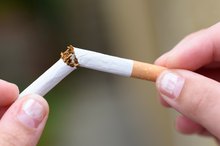Can Smoking Withdrawal Cause Physical Pain in the Body?
Nicotine is as addictive as alcohol, cocaine and morphine, according to MedlinePlus 1. Smoking withdrawal results in both mental and physical symptoms. These withdrawal symptoms usually peak in between the third and fifth days and fade after two weeks, but some can last for several months, warns “The New York Times.”
If you are experiencing serious medical symptoms, seek emergency treatment immediately.
Physical withdrawal symptoms include headaches and intestinal disorders, sore throat and chest pain from coughing, sweating and tingling in the extremities. Withdrawal symptoms of smoking should be treated just as any symptoms of disease or illness would be treated. Medical aids can reduce withdrawal symptoms, reports Community Health and Counseling Services. The American Cancer Society reports that medications can double your chances of success.
Sore Throat, Cough & Chest Pain
Smoking withdrawal can cause physical pain in the throat. You’ll often experience cold-like withdrawal symptoms from quitting smoking. NSW Department of Health reminds smokers that coughing is the way your lungs cleanse themselves of mucus and tar 3. You can develop sore chest muscles from coughing and because nicotine cravings may increase muscle tension, reports the Canadian Lung Association. Drink lots of water to help expel tar and thin mucus. Suck on cough drops or hard candies to ease a dry and scratchy sore throat. Take deep breaths to reduce muscle tension.
- Smoking withdrawal can cause physical pain in the throat.
- You can develop sore chest muscles from coughing and because nicotine cravings may increase muscle tension, reports the Canadian Lung Association.
Headache
Emotional Effects of Smoking
Learn More
Headache is one of the most common sources of physical pain associated with smoking withdrawal. Shifting oxygen and brain chemical levels, dietary changes associated with quitting smoking, anxiety and tension and sleep disruption may all contribute to headache pain. The NSW Department of Health reports that some of the physical aches and physical pains you experience while quitting smoking are due to improved circulation 3. Your blood vessels are dilating and your body must adapt to higher oxygen levels.
- Headache is one of the most common sources of physical pain associated with smoking withdrawal.
- The NSW Department of Health reports that some of the physical aches and physical pains you experience while quitting smoking are due to improved circulation 3.
Gastrointestinal Effects
Quitting smoking can cause changes in your intestinal and bowel movements and the anxiety related to smoking withdrawal may also come into play when you experience physical pain related to the gastrointestinal system. Constipation, gas, nausea and stomach pain are physical withdrawal symptoms associated with smoking withdrawal.
Increase your fiber intake and drink plenty of fluids to help ease the transition but be sure to add fiber slowly to give your body time to adjust.
Mental Symptoms
How do I Stop Smoking Cigars?
Learn More
While physical pain does play a role in smoking withdrawal, mental issues are much more prevalent when quitting smoking. These withdrawal symptoms are more likely to derail the quitter. Mental symptoms include anger, irritability and restlessness, anxiety and depression, difficulty concentrating or mental confusion and insomnia.
People prone to depression are 25 percent more likely to experience it when they try quitting smoking, and depressed smokers have a very low success rate, reports “The New York Times.” Depressed smokers are successful only 6 percent of the time. Family members and friends may actually encourage smoking to end the hostility and/or mood changes a smoker goes through during smoking withdrawal.
Depression risk can last for up to six months among those quitting smoking, so anti-anxiety medication, antidepressants and supportive therapy may be in order.
- While physical pain does play a role in smoking withdrawal, mental issues are much more prevalent when quitting smoking.
- Depression risk can last for up to six months among those quitting smoking, so anti-anxiety medication, antidepressants and supportive therapy may be in order.
Related Articles
References
- MedlinePlus: Nicotine addiction and withdrawal
- “The New York Times”; Making the Decision to Quit Tobacco; 2009
- NSW Department of Health: Nicotine Dependence and Withdrawal
- Managing withdrawal. U.S. Department of Health and Human Services.
- Cosci F, Pistelli F, Lazzarini N, Carrozzi L. Nicotine dependence and psychological distress: outcomes and clinical implications in smoking cessation. Psychol Res Behav Manag. 2011;4:119-28. doi:10.2147/PRBM.S14243
- Bruijnzeel AW. Tobacco addiction and the dysregulation of brain stress systems. Neurosci Biobehav Rev. 2012;36(5):1418-41. doi:10.1016/j.neubiorev.2012.02.015
- Nicotine replacement therapy. U.S. National Library of Medicine. U.S. Department of Health and Human Services.
- Biology of addiction. National Institutes of Health. U.S. Department of Health and Human Services. 2015.
- Taylor G, Mcneill A, Girling A, Farley A, Lindson-hawley N, Aveyard P. Change in mental health after smoking cessation: systematic review and meta-analysis. BMJ. 2014;348:g1151. doi:10.1136/bmj.g1151
- Moylan S, Jacka FN, Pasco JA, Berk M. How cigarette smoking may increase the risk of anxiety symptoms and anxiety disorders: a critical review of biological pathways. Brain Behav. 2013;3(3):302-26. doi:10.1002/brb3.137
- Gil SM, Metherate R. Enhanced Sensory-Cognitive Processing by Activation of Nicotinic Acetylcholine Receptors. Nicotine Tob Res. 2019;21(3):377-382. doi:10.1093/ntr/nty134
- Lee H, Kim S, Kim D. Effects of exercise with or without light exposure on sleep quality and hormone reponses. J Exerc Nutrition Biochem. 2014;18(3):293-9. doi:10.5717/jenb.2014.18.3.293
- Chéruel F, Jarlier M, Sancho-garnier H. Effect of cigarette smoke on gustatory sensitivity, evaluation of the deficit and of the recovery time-course after smoking cessation. Tob Induc Dis. 2017;15:15. doi:10.1186/s12971-017-0120-4
- How to handle withdrawal symptoms and triggers when you decide to quit smoking. National Cancer Institute. 2010.
- Carim-todd L, Mitchell SH, Oken BS. Mind-body practices: an alternative, drug-free treatment for smoking cessation? A systematic review of the literature. Drug Alcohol Depend. 2013;132(3):399-410. doi:10.1016/j.drugalcdep.2013.04.014
- Nutrition and appetite while quitting. U.S. Department of Health and Human Services.
- Nicotine replacement therapy. U.S. National Library of Medicine. 2019.
- Nicotine replacement therapy for quitting tobacco. American Cancer Society. 2017.
- Schnoll RA, Goelz PM, Veluz-wilkins A, et al. Long-term nicotine replacement therapy: a randomized clinical trial. JAMA Intern Med. 2015;175(4):504-11. doi:10.1001/jamainternmed.2014.8313
- Martínez-vispo C, Rodríguez-cano R, et al. Cognitive-behavioral treatment with behavioral activation for smoking cessation: Randomized controlled trial. PLoS ONE. 2019;14(4):e0214252. doi:10.1371/journal.pone.0214252
- How to handle withdrawal symptoms and triggers when you decide to quit smoking. National Cancer Institute. Reviewed October 29, 2010.
- Edwards A, Kendler K. Nicotine withdrawal-induced negative affect is a function of nicotine dependence and not liability to depression or anxiety. Nicotine & Tobacco Research. 2011;13:677-85.
- Johnson K, Stewart S, Rosenfield D, Steeves D, Zvolensky M. Prospective evaluation of the effects of anxiety sensitivity and state anxiety in predicting acute nicotine withdrawal symptoms during smoking cessation. Psychology of Addictive Behaviors. 2012;26:289-297.
- Leyro TM, Zvolensky MJ. The interaction of nicotine withdrawal and panic disorder in the prediction of panic-relevant responding to a biological challenge. Psychology of Addictive Behaviors. 2013;27(1):90-101
Writer Bio
Sumei FitzGerald has been writing professionally since 2008 on health, nutrition, medicine and science topics. She has published work on doctors' websites such as Colon Cancer Resource, psychology sites such as Webpsykologen and environmental websites such as Supergreenme. She holds a Bachelor of Arts in sociology from the University of Connecticut where she also studied life sciences.









